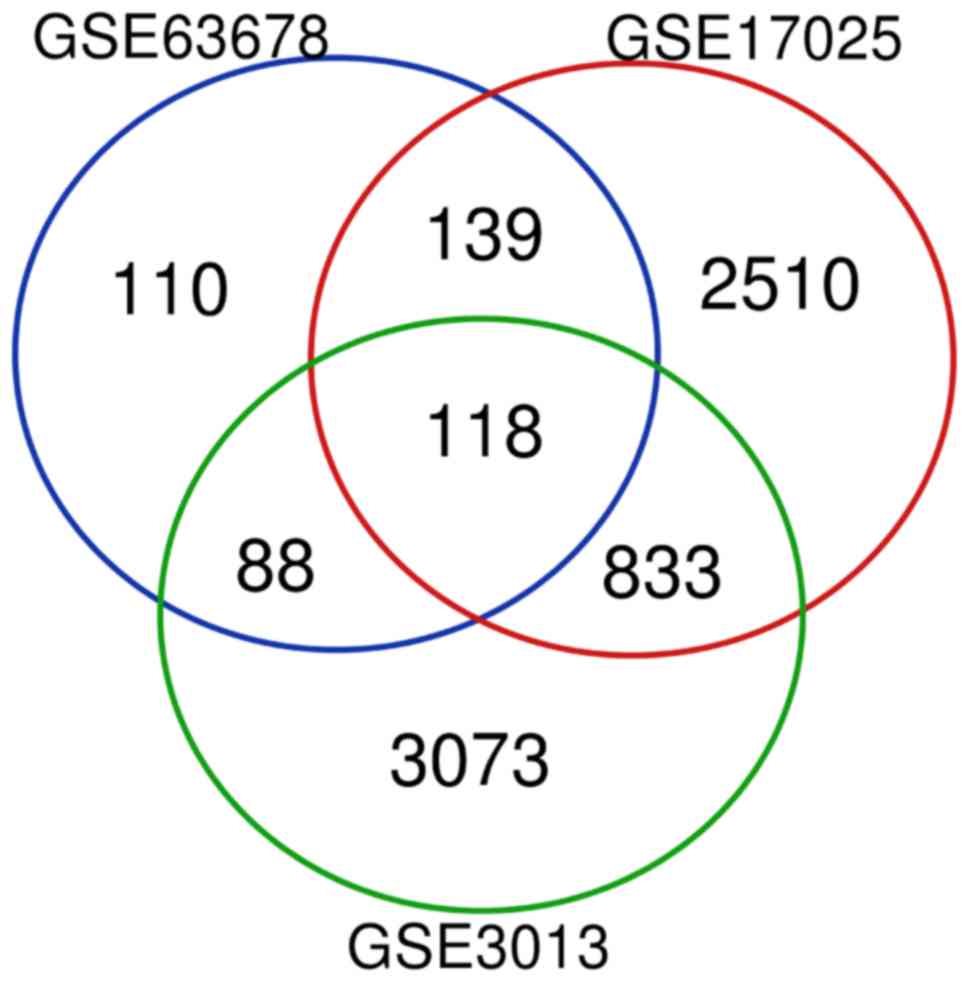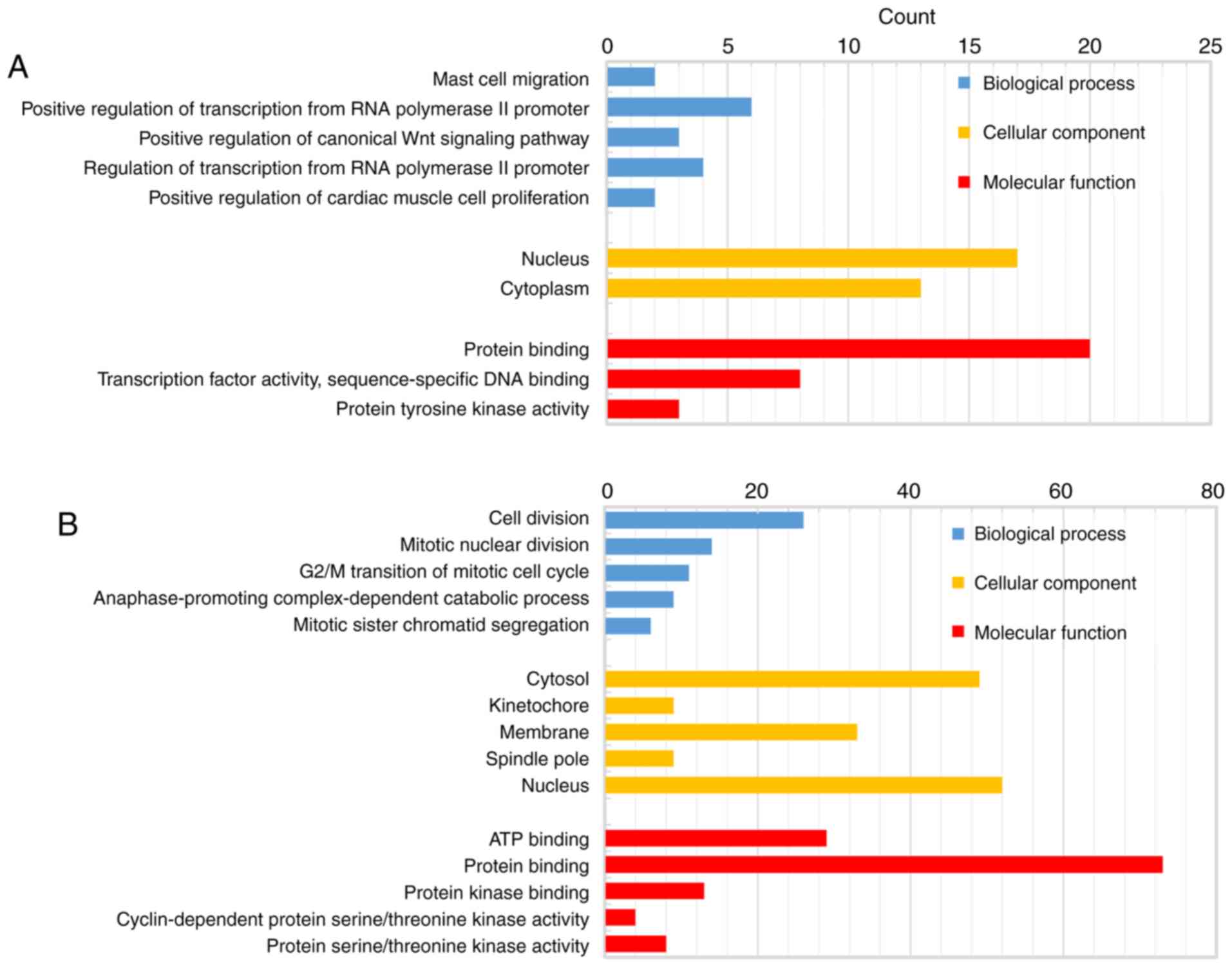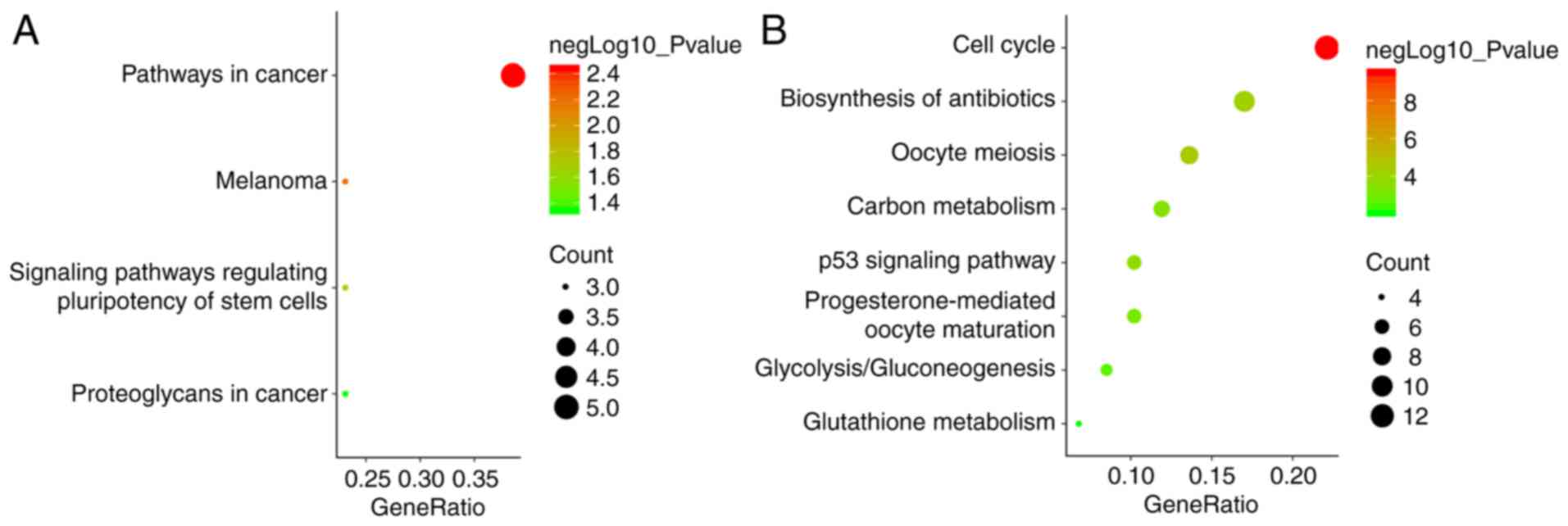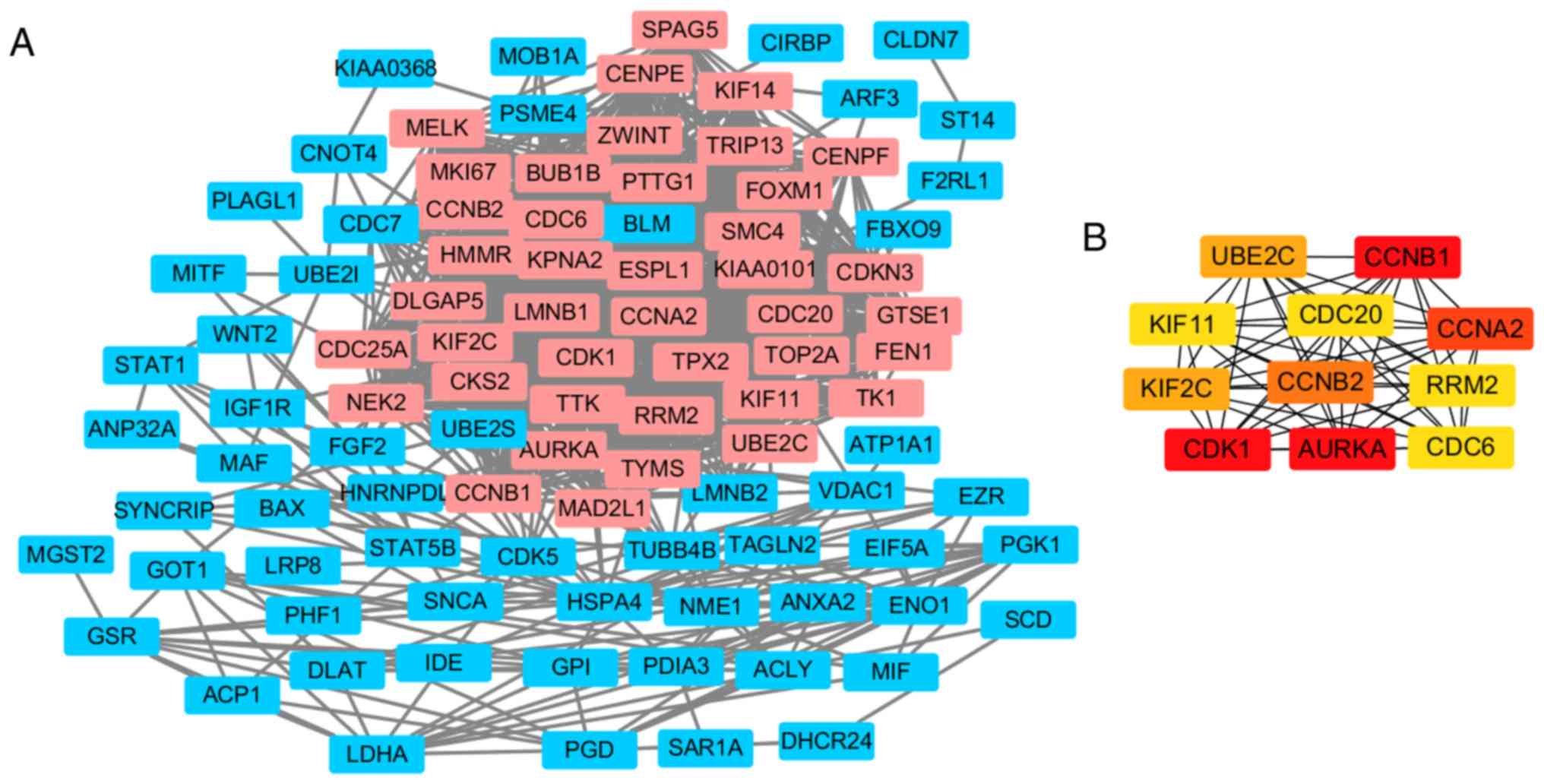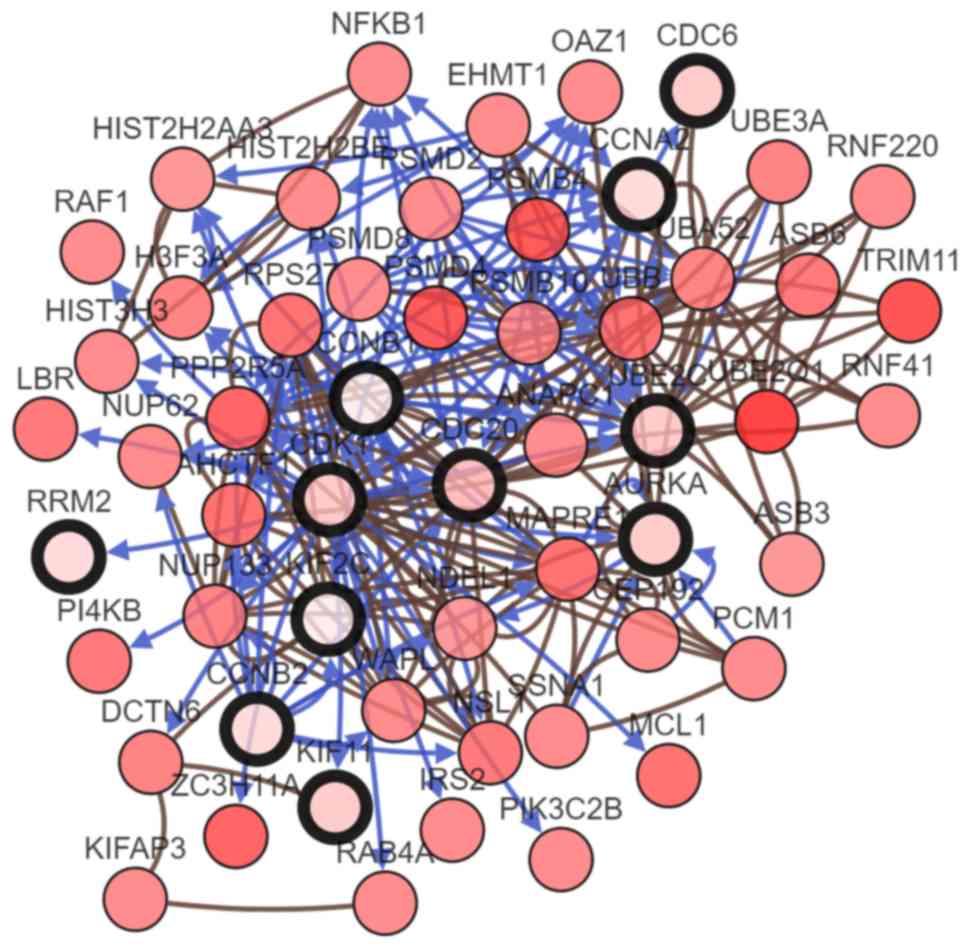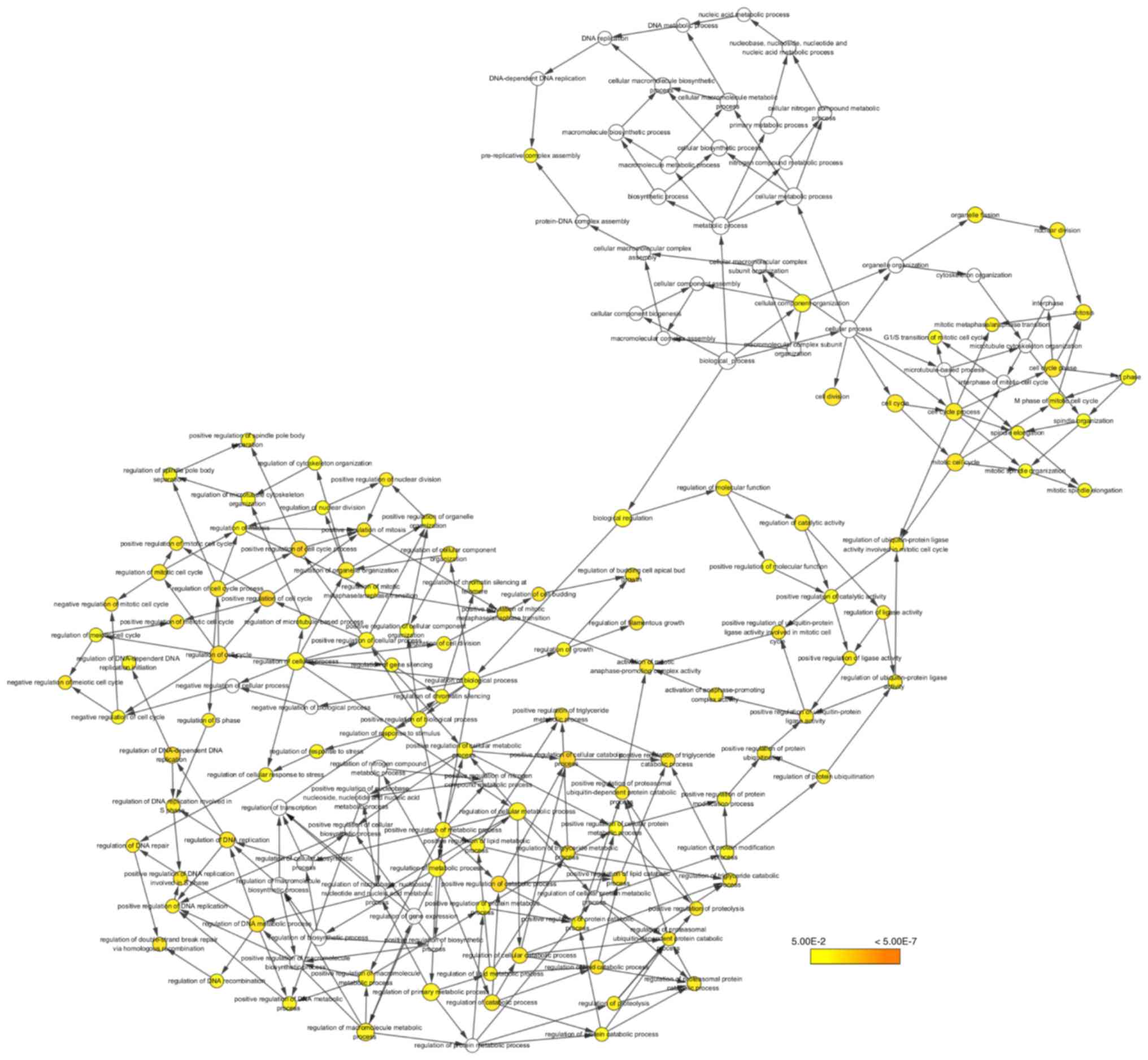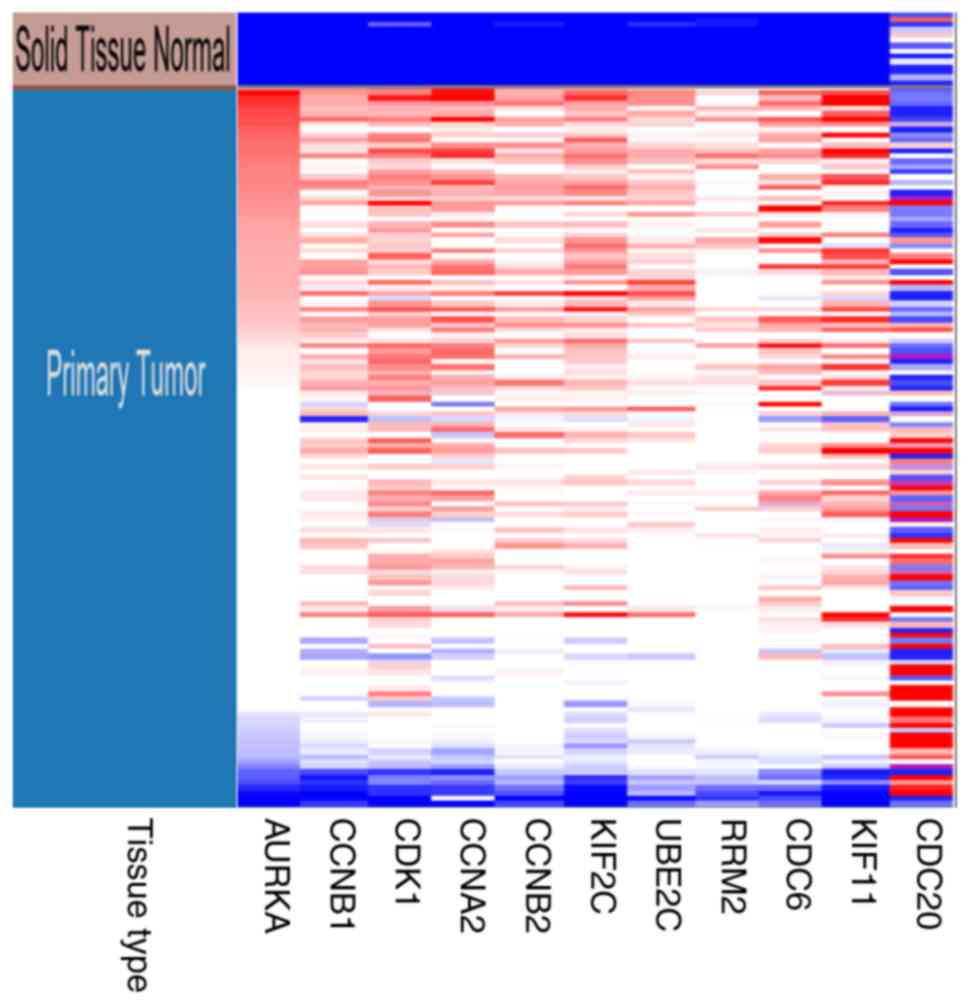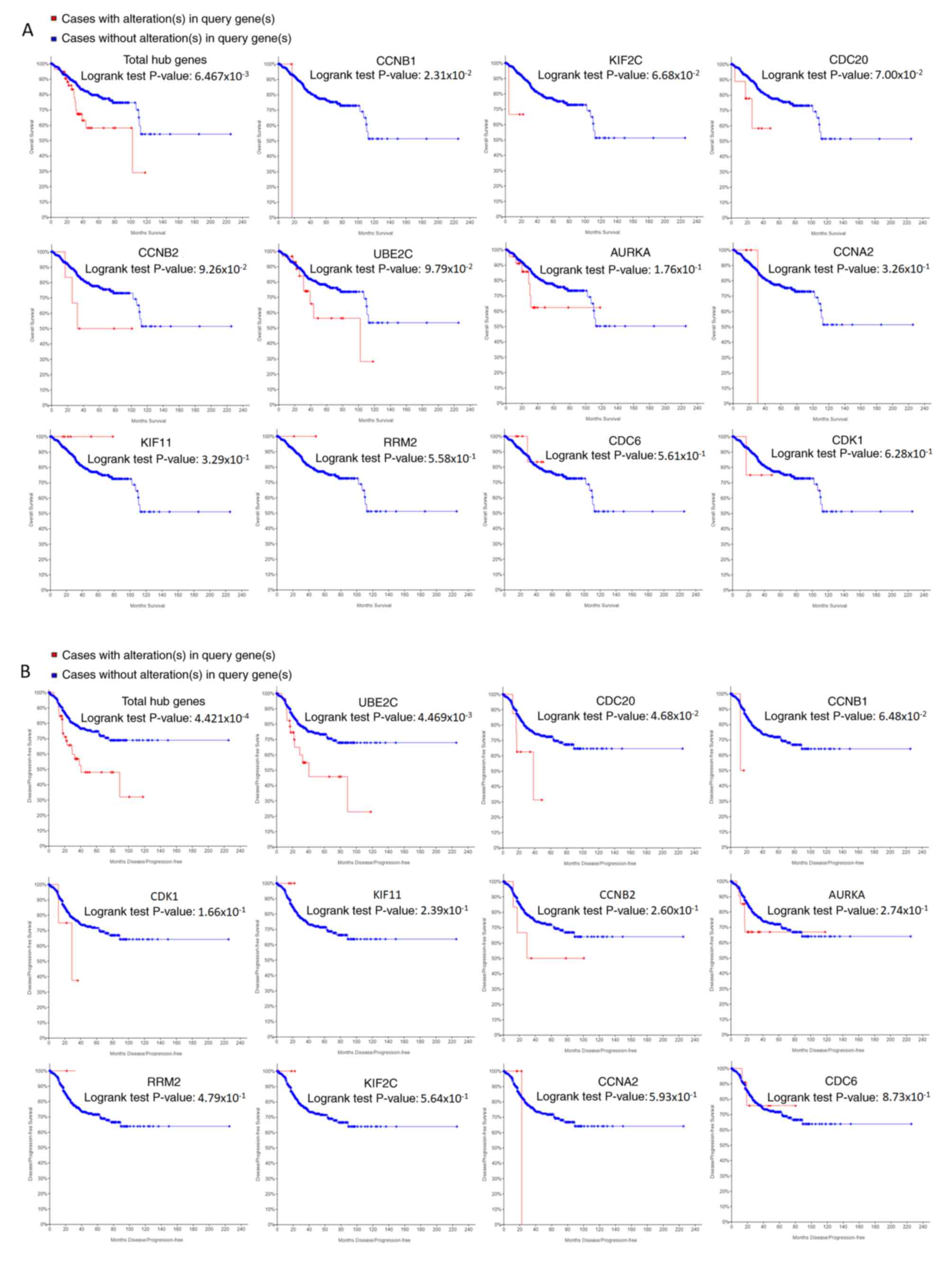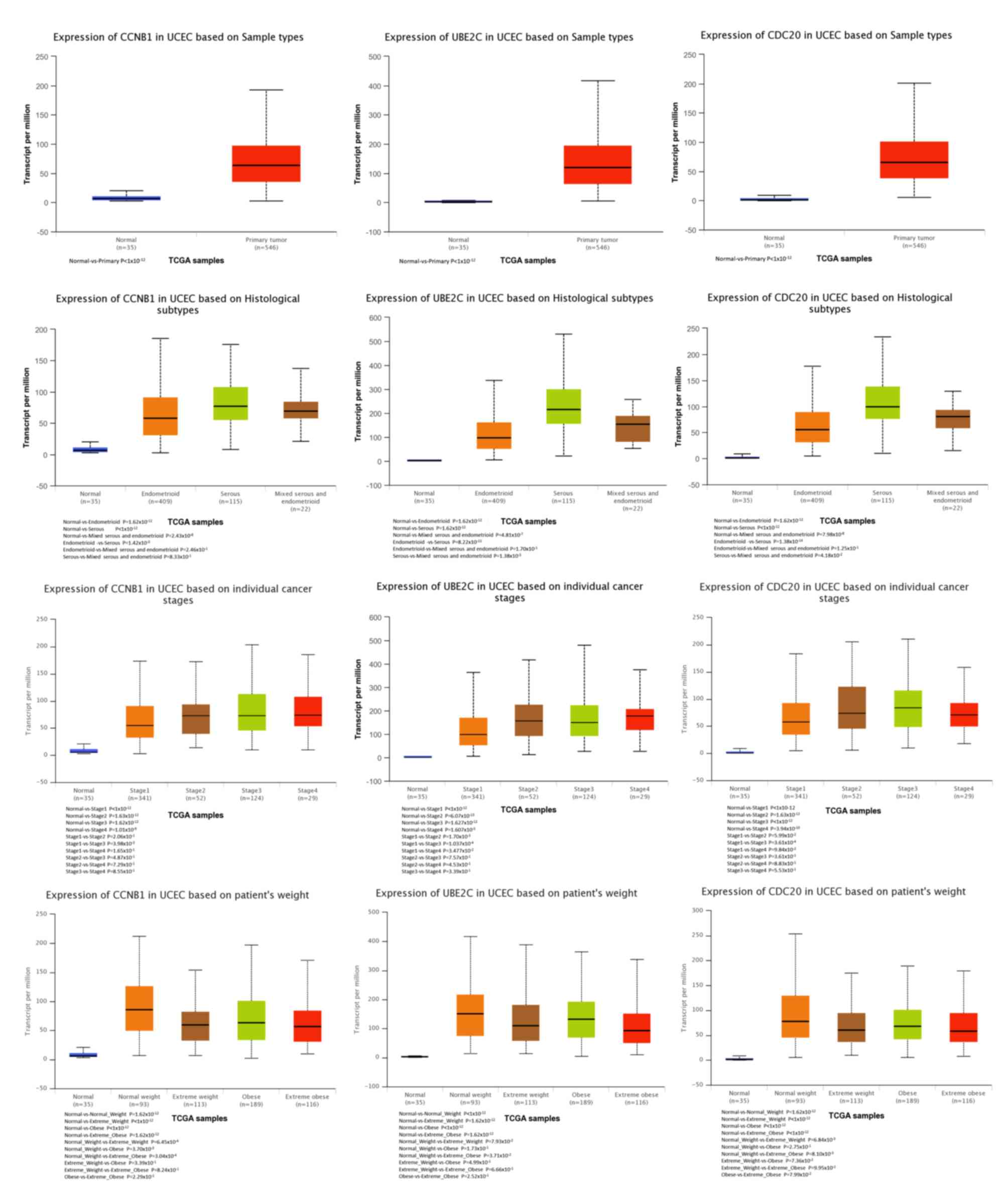|
1
|
Eritja N, Yeramian A, Chen BJ,
Llobet-Navas D, Ortega E, Colas E, Abal M, Dolcet X, Reventos J and
Matias-Guiu X: Endometrial carcinoma: Specific targeted pathways.
Adv Exp Med Biol. 943:149–207. 2017. View Article : Google Scholar : PubMed/NCBI
|
|
2
|
Patni R: Endometrial carcinoma: Evolution
and overviewCurrent Concepts in Endometrial Cancer. Singapore:
Springer; pp. 1–9. 2017, View Article : Google Scholar
|
|
3
|
Bokhman JV: Two pathogenetic types of
endometrial carcinoma. Gynecol Oncol. 15:10–17. 1983. View Article : Google Scholar : PubMed/NCBI
|
|
4
|
Tran AQ and Gehrig P: Recent advances in
endometrial cancer. F1000Res. 6:812017. View Article : Google Scholar : PubMed/NCBI
|
|
5
|
Sheets SSF: Endometrial cancer.
Surveillance, Epidemiology, and End Results Program. seer. cancer.
gov. 2015.
|
|
6
|
Lax SF, Kendall B, Tashiro H, Slebos RJ
and Ellenson L: The frequency of p53, k-ras mutations, and
microsatellite instability differs in uterine endometrioid and
serous carcinoma: Evidence of distinct molecular genetic pathways.
Cancer. 88:814–24. 2000. View Article : Google Scholar : PubMed/NCBI
|
|
7
|
Feng ZZ, Chen WJ, Yang ZR, Lu ZG and Cai
ZG: Expression of PTTG1 and PTEN in endometrial carcinoma:
Correlation with tumorigenesis and progression. Med Oncol.
29:304–310. 2012. View Article : Google Scholar : PubMed/NCBI
|
|
8
|
Basil JB, Goodfellow PJ, Rader JS, Mutch
DG and Herzog TJ: Clinical significance of microsatellite
instability in endometrial carcinoma. Cancer. 89:1758–1764. 2000.
View Article : Google Scholar : PubMed/NCBI
|
|
9
|
Hecht JL and Mutter GL: Molecular and
pathologic aspects of endometrial carcinogenesis. J Clin Oncol.
24:4783–4791. 2006. View Article : Google Scholar : PubMed/NCBI
|
|
10
|
Clough E and Barrett T: The gene
expression omnibus database//Statistical GenomicsNew York: Humana
Press; pp. 93–110. 2106
|
|
11
|
Pappa KI, Polyzos A, Jacob-Hirsch J,
Amariglio N, Vlachos GD, Loutradis D and Anagnou NP: Profiling of
discrete gynecological cancers reveals novel transcriptional
modules and common features shared by other cancer types and
embryonic stem cells. PLoS One. 10:e01422292015. View Article : Google Scholar : PubMed/NCBI
|
|
12
|
Day RS, McDade KK, Chandran UR, Lisovich
A, Conrads TP, Hood BL, Kolli VK, Kirchner D, Litzi T and Maxwell
GL: Identifier mapping performance for integrating transcriptomics
and proteomics experimental results. BMC Bioinformatics.
12:2132011. View Article : Google Scholar : PubMed/NCBI
|
|
13
|
Wu H, Chen Y, Liang J, Shi B, Wu G, Zhang
Y, Wang Y, Wang D, Li R, Yi X, et al: Hypomethylation-linked
activation of PAX2 mediates tamoxifen-stimulated endometrial
carcinogenesis. Nature. 438:981–987. 2005. View Article : Google Scholar : PubMed/NCBI
|
|
14
|
Huang DW, Sherman BT and Lempicki RA:
Systematic and integrative analysis of large gene lists using DAVID
bioinformatics resources. Nat Protoc. 4:44–57. 2009. View Article : Google Scholar : PubMed/NCBI
|
|
15
|
Kanehisa M: The KEGG database//‘In
Silico'Simulation of Biological Processes: Novartis Foundation
Symposium 247. Chichester, UK, John Wiley & Sons, Ltd,.
247:91–103. 2002.
|
|
16
|
Harris MA, Clark J, Ireland A, Lomax J,
Ashburner M, Foulger R, Eilbeck K, Lewis S, Marshall B, Mungall C,
et al: The Gene Ontology (GO) database and informatics resource.
Nucleic Acids Res. 32((Database Issue)): D258–D261. 2004.PubMed/NCBI
|
|
17
|
Ashburner M, Ball CA, Blake JA, Botstein
D, Butler HL, Cherry JM, Davis AP, Dolinski K, Dwight SS, Eppig JT,
et al: Gene ontology: Tool for the unification of biology. The Gene
Ontology Consortium. Nat Genet. 25:25–29. 2000. View Article : Google Scholar : PubMed/NCBI
|
|
18
|
Szklarczyk D, Franceschini A, Wyder S,
Forslund K, Heller D, Huertacepas J, Simonovic M, Roth A, Santos A,
Tsafou K, et al: STRING v10: Protein-protein interaction networks,
integrated over the tree of life. Nucleic Acids Res. 43((Database
Issue)): D447–D452. 2015. View Article : Google Scholar : PubMed/NCBI
|
|
19
|
Smoot ME, Ono K, Ruscheinski J, Wang P and
Ideker T: Cytoscape 2.8: New features for data integration and
network visualization. Bioinformatics. 27:431–432. 2011. View Article : Google Scholar : PubMed/NCBI
|
|
20
|
Bandettini WP, Kellman P, Mancini C,
Booker OJ, Vasu S, Leung SW, Wilson JR, Shanbhag SM, Chen MY and
Arai AE: MultiContrast delayed enhancement (MCODE) improves
detection of subendocardial myocardial infarction by late
gadolinium enhancement cardiovascular magnetic resonance: A
clinical validation study. J Cardiovasc Magn Reson. 14:832012.
View Article : Google Scholar : PubMed/NCBI
|
|
21
|
Cerami E, Gao J, Dogrusoz U, Gross BE,
Sumer SO, Aksoy BA, Jacobsen A, Byrne AJ, Heuer ML, Larsson EG, et
al: The cBio cancer genomics portal: An open platform for exploring
multidimensional cancer genomics data. Cancer Discov. 2:401–404.
2012. View Article : Google Scholar : PubMed/NCBI
|
|
22
|
Maere S, Heymans K and Kuiper M: BiNGO: A
Cytoscape plugin to assess overrepresentation of Gene Ontology
categories in Biological Networks. Bioinformatics. 21:3448–3449.
2005. View Article : Google Scholar : PubMed/NCBI
|
|
23
|
Goldman M, Craft B, Hastie M, Repečka K,
Kamath A, McDade F, Rogers D, Brooks AN, Zhu J and Haussler D: The
UCSC Xena Platform for cancer genomics data visualization and
interpretation. BioRxiv. 3264702019.
|
|
24
|
Tang Z, Li C, Kang B, Gao G, Li C and
Zhang Z: GEPIA: A web server for cancer and normal gene expression
profiling and interactive analyses. Nucleic Acids Res. 45:W98–W102.
2017. View Article : Google Scholar : PubMed/NCBI
|
|
25
|
Chandrashekar DS, Bashel B, Balasubramanya
SAH, Creighton CJ, Ponce-Rodriguez I, Chakravarthi BVSK and
Varambally S: UALCAN: A portal for facilitating tumor subgroup gene
expression and survival analyses. Neoplasia. 19:649–658. 2017.
View Article : Google Scholar : PubMed/NCBI
|
|
26
|
Tomczak K, Czerwinska P and Wiznerowicz M:
Review the cancer genome atlas (TCGA): An immeasurable source of
knowledge. Contemp Oncol (Pozn). 19:A68–A77. 2015.PubMed/NCBI
|
|
27
|
Werner T: Bioinformatics applications for
pathway analysis of microarray data. Curr Opin Biotechnol.
19:50–54. 2008. View Article : Google Scholar : PubMed/NCBI
|
|
28
|
Moreau Y, De Smet F, Thijs G, Marchal K
and De Moor B: Functional bioinformatics of microarray data: From
expression to regulation. Proceedings IEEE. 90:1722–1743. 2002.
View Article : Google Scholar
|
|
29
|
Ye Q, Lei L and Aili AX: Identification of
potential targets for ovarian cancer treatment by systematic
bioinformatics analysis. Eur J Gynaecol Oncol. 36:283–289.
2015.PubMed/NCBI
|
|
30
|
Ai Z, Wang J, Xu Y and Teng Y:
Bioinformatics analysis reveals potential candidate drugs for
cervical cancer. J Obstet Gynaecol Res. 39:1052–1058. 2013.
View Article : Google Scholar : PubMed/NCBI
|
|
31
|
Tejera E, Bernardes J and Rebelo I:
Preeclampsia: A bioinformatics approach through protein-protein
interaction networks analysis. BMC Syst Biol. 6:972012. View Article : Google Scholar : PubMed/NCBI
|
|
32
|
Huang V, Zheng J, Qi Z, Wang J, Place RF,
Yu J, Li H and Li LC: Ago1 Interacts with RNA polymerase II and
binds to the promoters of actively transcribed genes in human
cancer cells. PLoS Genet. 9:e10038212013. View Article : Google Scholar : PubMed/NCBI
|
|
33
|
Lacey JV, Potischman N, Madigan MP, Berman
ML, Mortel R, Twiggs LB, Barrett RJ, Wilbanks GD, Lurain JR,
Fillmore CM, et al: Insulin-like growth factors, insulin-like
growth factor-binding proteins, and endometrial cancer in
postmenopausal women: Results from a U.S. case-control study.
Cancer Epidemiol Biomarkers Prev. 13:607–612. 2004.PubMed/NCBI
|
|
34
|
Suman S and Mishra A: Network analysis
revealed aurora kinase dysregulation in five gynecological types of
cancer. Oncol Lett. 15:1125–1132. 2018.PubMed/NCBI
|
|
35
|
Ferguson SE, Olshen AB, Viale A, Awtrey
CS, Barakat RR and Boyd J: Gene expression profiling of
tamoxifen-associated uterine cancers: Evidence for two molecular
classes of endometrial carcinoma. Gynecol Oncol. 92:719–725. 2004.
View Article : Google Scholar : PubMed/NCBI
|
|
36
|
Krause K, Wasner M, Reinhard W, Haugwitz
U, Dohna CL, Mössner J and Engeland K: The tumour suppressor
protein p53 can repress transcription of cyclin B. Nucleic Acids
Res. 28:4410–4418. 2000. View Article : Google Scholar : PubMed/NCBI
|
|
37
|
Agostino SD, Strano S, Emiliozzi V,
Zerbini V, Mottolese M, Sacchi A, Blandino G and Piaggio G: Gain of
function of mutant p53: The mutant p53/NF-Y protein complex reveals
an aberrant transcriptional mechanism of cell cycle regulation.
Cancer Cell. 10:191–202. 2006. View Article : Google Scholar : PubMed/NCBI
|
|
38
|
Alam SK, Yadav VK, Bajaj S, Datta A, Dutta
SK, Bhattacharyya M, Bhattacharya S, Debnath S, Roy S, Boardman LA,
et al: DNA damage-induced ephrin-B2 reverse signaling promotes
chemoresistance and drives EMT in colorectal carcinoma harboring
mutant p53. Cell Death Differ. 23:707–722. 2016. View Article : Google Scholar : PubMed/NCBI
|
|
39
|
Sisovsky V, Lasabova Z, Straka L, Telkova
M, Rychly B, Minarik G, Gemzova K, Petrovic R, Szemes T, Turna J,
et al: Tumour suppressor gene and protein TP53/P53 in normal
endometrium and endometrial carcinoma. Pathology. 46 (Suppl
2):S912014. View Article : Google Scholar
|
|
40
|
Cai H, Xiang Y, Qu S, Long J, Cai Q, Gao
J, Zheng W and Shu XO: Association of genetic polymorphisms in
cell-cycle control genes and susceptibility to endometrial cancer
among Chinese women. Am J Epidemiol. 173:1263–1271. 2011.
View Article : Google Scholar : PubMed/NCBI
|
|
41
|
Nicolau-Neto P, Palumbo A, De Martino M,
Esposito F, de Almeida Simão T, Fusco A, Nasciutti LE, Meireles Da
Costa N and Ribeiro Pinto LF: UBE2C is a transcriptional target of
the cell cycle regulator FOXM1. Genes. 9(pii): E1882018. View Article : Google Scholar : PubMed/NCBI
|
|
42
|
Wang H, Zhang C, Rorick A, Wu D, Chiu M,
Thomas-Ahner J, Chen Z, Chen H, Clinton SK, Chan KK and Wang Q:
CCI-779 inhibits cell-cycle G2/M progression and invasion of
castration resistant prostate cancer via attenuation of UBE2C
transcription and mRNA stability. Cancer Res. 71:4866–4876. 2011.
View Article : Google Scholar : PubMed/NCBI
|
|
43
|
Shen Z, Jiang X, Zeng C, Zheng S, Luo B,
Zeng Y, Ding R, Jiang H, He Q, Guo J and Jie W: High expression of
ubiquitin-conjugating enzyme 2C (UBE2C) correlates with
nasopharyngeal carcinoma progression. BMC Cancer. 13:1922013.
View Article : Google Scholar : PubMed/NCBI
|
|
44
|
Fujita T, Ikeda H, Taira N, Hatoh S, Naito
M and Doihara H: Overexpression of UbcH10 alternates the cell cycle
profile and accelerate the tumor proliferation in colon cancer. BMC
Cancer. 9:872009. View Article : Google Scholar : PubMed/NCBI
|
|
45
|
Guo L, Ding Z, Huang N, Huang Z, Zhang N
and Xia Z: Forkhead Box M1 positively regulates UBE2C and protects
glioma cells from autophagic death. Cell Cycle. 16:1705–1718. 2017.
View Article : Google Scholar : PubMed/NCBI
|
|
46
|
Bajaj S, Alam SK, Roy KS, Datta A, Nath S
and Roychoudury S: E2 Ubiquitin-conjugating Enzyme, UBE2C Gene, is
reciprocally regulated by Wild-type and Gain-of-Function Mutant
p53. J Biol Chem. 291:14231–14247. 2016. View Article : Google Scholar : PubMed/NCBI
|
|
47
|
Takahashi Y, Ishii Y, Nishida Y, Ikarashi
M, Nagata T, Nakamura T, Yamamori S and Asai S: Detection of
aberrations of ubiquitin-conjugating enzyme E2C gene (UBE2C) in
advanced colon cancer with liver metastases by DNA microarray and
two-color FISH. Cancer Genet Cytogenet. 168:30–35. 2006. View Article : Google Scholar : PubMed/NCBI
|
|
48
|
Tzelepi V, Zhang J, Lu JF, Kleb B, Wu G,
Wan X, Hoang A, Efstathiou E, Sircar K, Navone NM, et al: Modeling
a lethal prostate cancer variant with small-cell carcinoma
features. Clin Cancer Res. 18:666–677. 2012. View Article : Google Scholar : PubMed/NCBI
|
|
49
|
Sakai N, Kajiyama Y, Iwanuma Y, Tomita N,
Amano T, Isayama F, Ouchi K and Tsurumaru M: Study of abnormal
chromosome regions in esophageal squamous cell carcinoma by
comparative genomic hybridization: Relationship of lymph node
metastasis and distant metastasis to selected abnormal regions. Dis
Esophagus. 23:415–421. 2010.PubMed/NCBI
|
|
50
|
Harper JW, Burton JL and Solomon MJ: The
anaphase-promoting complex: It's not just for mitosis any more.
Genes Dev. 16:2179–2206. 2002. View Article : Google Scholar : PubMed/NCBI
|
|
51
|
Yuan B, Xu Y, Woo JH, Wang Y, Bae YK, Yoon
DS, Wersto RP, Tully E, Wilsbach K and Gabrielson E: Increased
expression of mitotic checkpoint genes in breast cancer cells with
chromosomal instability. Clin Cancer Res. 12:405–410. 2006.
View Article : Google Scholar : PubMed/NCBI
|
|
52
|
Gayyed MF, Elmaqsoud NM, Tawfiek ER, El
Gelany SA and Rahman MF: A comprehensive analysis of CDC20
overexpression in common malignant tumors from multiple organs: Its
correlation with tumor grade and stage. Tumor Biol. 37:749–762.
2016. View Article : Google Scholar
|
|
53
|
Liu L, Chen F, Xiu A, Du B, Ai H and Xie
W: Identification of key candidate genes and pathways in
endometrial cancer by integrated bioinformatical analysis. Asian
Pac J Cancer Prev. 19:969–975. 2018.PubMed/NCBI
|















